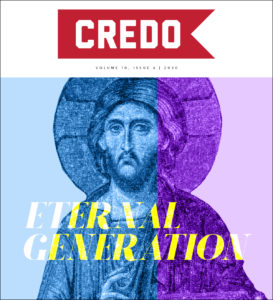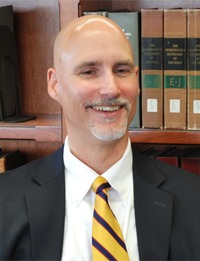
God the Son and the Covenant of Grace
T he new issue of Credo Magazine focuses on the eternal generation of the Son. The following is an excerpt from one of the issue’s featured articles with R. Scott Clark. Clark (DPhil Oxford University) was a minister in the Reformed Church in the United States (1988–1998) and has been a minister in the United Reformed Churches in North America since 1998. He has taught church history and historical theology since 1995 at Wheaton College, Reformed Theological Seminary, Jackson, Concordia University, Irvine, and Westminster Seminary California. He is the author of Recovering the Reformed Confession: Our Theology, Piety, and Practice and Caspar Olevian and the Substance of the Covenant: The Double Benefit of Christ.
he new issue of Credo Magazine focuses on the eternal generation of the Son. The following is an excerpt from one of the issue’s featured articles with R. Scott Clark. Clark (DPhil Oxford University) was a minister in the Reformed Church in the United States (1988–1998) and has been a minister in the United Reformed Churches in North America since 1998. He has taught church history and historical theology since 1995 at Wheaton College, Reformed Theological Seminary, Jackson, Concordia University, Irvine, and Westminster Seminary California. He is the author of Recovering the Reformed Confession: Our Theology, Piety, and Practice and Caspar Olevian and the Substance of the Covenant: The Double Benefit of Christ.
In the Summer of 1570 the Reformed Reformation in Heidelberg faced a crisis. Several of the Zwinglians, who had sided with Erastus against the Calvinist order in the Palatinate, were perceived by their Calvinist opponents to be arguing for something that looked like Arianism. This was a crisis because the Lutheran electors were already suspicious of Frederick III (1515–76) because of his Calvinism. As such, he denied the Lutheran version of the communication of properties (communicatio idiomatum), the ubiquity of Christ’s humanity, and the Lutheran view of the Supper. The Lutherans had already summoned him to the Colloquy of Maulbronn in 1564 to answer for his Reformed convictions and, had he failed to satisfy them, he faced a possible invasion. Thus, both the political and the theological stakes were high in the discovery of any heresy against the ecumenical faith in Heidelberg.
One of the heretics, Adam Neuser (c. 1530–76) escaped arrest and fled to Turkey but the controversy with the anti-Trinitiarians continued until December 23, 1572 when, despite the judgment of the civil judges that he should receive only corporal and not capital punishment, the Elector bowed to pressure from the theologians, including Caspar Olevianus (1536–87), and ordered that capital punished be applied to Johann Sylvan.
A Standard of Orthodoxy
That heresy against the ecumenical faith should be a capital crime was hardly unusual in pre-Modern Christendom nor was it unusual to see theologians demanding the state to enforce religious orthodoxy. This episode, however, illustrates the intensity with which the Heidelberg Calvinists held to the ancient, ecumenical Trinitarian faith, including the doctrine of the eternal generation of the Son. When Kevin Giles subtitles his defense of eternal generation, “maintaining orthodoxy in Trinitarian theology,” he echoes that tradition. The Heidelberg Calvinists held to the ancient, ecumenical Trinitarian faith, including the doctrine of the eternal generation of the Son. Click To Tweet
Caspar Olevianus is typically understood only as figure relative to the development of Reformed covenant theology or in light of his contribution to the Heidelberg Catechism (1563). That is a truncated view of the nature of Reformed covenant theology and of Olevianus’ contribution to it. For Olevianus, catholic orthodoxy, including the eternal generation of the Son, was an element of the substance of the covenant of grace.
Peter the Lombard (c. 1100–60) wrote the most influential theological textbook in the Medieval period. Lecturing on his Sentences (c. 1158) was a necessary step in becoming an accredited theologian in the university. His appropriation and synthesis of the Christian tradition influenced Western theology for 400 years after it first appeared. Though we are not always aware of it, Christians continue to rely on Peter’s formulations. So it is instructive to note that for him to teach the doctrine of God (book 1) was to teach the doctrine of the Trinity and for him to teach doctrine of the Trinity was to teach the doctrine of the eternal generation of the Son.
As he understood the history of Christian teaching, the doctrine of eternal generation was a basic part of Christian orthodoxy. Beginning in dist. 4 he treated as axiomatic for Christians to say “[w]e know, and it is true beyond doubt, that God the Father begot the Son…”. He quoted the Nicene-Constantinopolitan Creed, “Light of light, true God of true God,” which he took to be the ecumenical confession of the eternal generation of the Son. He carried on this discussion through dist. 5, citing along the way Augustine, On the Trinity, Fulgentius of Ruspe, On Faith, Hilary, On the Trinity, Ambrose, On Faith, as well as Chrysostom, and Origen. For Olevianus, catholic orthodoxy, including the eternal generation of the Son, was an element of the substance of the covenant of grace. Click To Tweet
Thus, when John Calvin (1509–64) explained the doctrine of the Trinity, in Institutes 1.13, he spoke first to the unity and simplicity of God (1.13.1), then to the subsistence of the Father, Son, and Holy Spirit (1.13.2–6). His third topic under heading of the Trinity was the deity of the Son and the Spirit (1.13.7). It would be “absurd” to imagine that the “Word of God” (verbum Dei) refers to anything temporary. Rather, that verbum is the eternal wisdom of God that resides with God. Thus it was the Spirit of Christ who spoke through the Old Testament prophets (1 Pet 1:1). “Because Christ was not yet manifested [under the Old Testament], it is necessary to understand that the Word was begotten of the Father before from eternity.” Later, in the Institutes, he re-asserted the doctrine of the eternal generation (ab aeterna genitura) of the Son against Michael Servetus (c. 1509/11–53) and Nestorius’ error of making Christ a composition of human and divine elements.
Eternal Generation and the Heidelberg Catechism
In his lectures on Heidelberg Catechism 25, Olevianus’ colleague, Zacharias Ursinus (1534–83), taught explicitly the doctrine of the eternal generation of the Son.
Therefore the order of the existing of the persons is this: the Father is the first person and the source of divinity of the Son and of the Spirit. Because to him deity is communicated by no one but from himself he communicates deity to the Son and to the Holy Spirit. The Son is the second person [of the Trinity] because deity is communicated to him from the Father through eternal generation….
Ursinus would appeal to the datum of the Son’s eternal generation throughout his lectures, e.g., in his defense of the deity of the Son under Heidelberg Catechism 33 in response to those who, by confusing the creature with the Creator, denied the Son’s eternal deity. The objection says: “Whatever has a beginning is not eternal. The Son has a beginning. Therefore he is not that eternal Jehovah, who is the Father.”
Ursinus responded, “He is not eternal who has a beginning of essence and of time. But the Son is not said to have a beginning of essence and of time but only of person and order. For he has one and eternal essence with the Father, not of time, but by eternal generation.” One finds the same sorts of arguments in early Reformed orthodox theologians such as Thomas Cartwright (1535–1603), Franciscus Junius (1545–1602), and William Perkins (1558–1602).
**Read the remainder of R. Scott Clark’s article in the latest issue of Credo Magazine.

